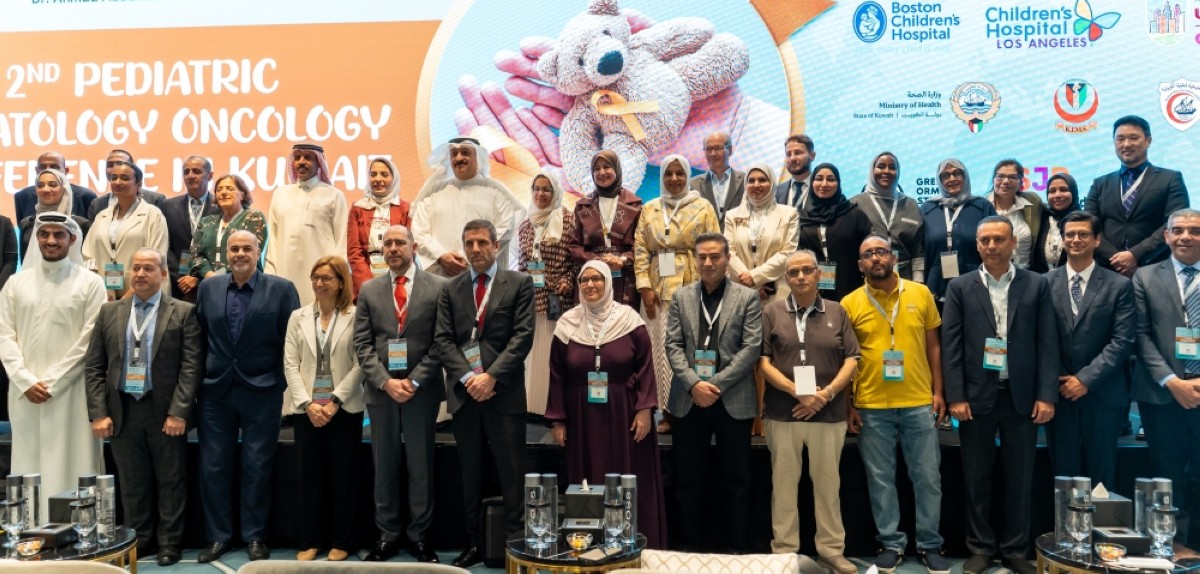KUWAIT: Minister of Health Dr Ahmad Al-Awadhi affirmed that Kuwait’s healthcare system has witnessed remarkable strides in recent years, particularly in the reduction of cases referred abroad for treatment. This progress, he said, stems from the introduction of cutting-edge medical therapies and the training of national healthcare professionals in internationally accredited treatment protocols.
Speaking at the opening of the Second Pediatric Hematology and Oncology Conference on Monday, hosted by the Department of Pediatric Hematology and Oncology at the National Bank of Kuwait (NBK) Specialized Children’s Hospital, Dr Al-Awadhi emphasized the importance of the event as a key scientific platform bringing together leading global experts in this critical field of medicine. The conference aims to foster knowledge exchange and present the latest advancements in diagnosing and treating pediatric blood disorders and cancer, with a particular focus on central nervous system tumors, including those affecting the brain and nerves. Discussions also include lymphatic system cancers such as lymphoma — one of the most prevalent pediatric malignancies — as well as recent developments in treating acute and chronic leukemia. In addition, the conference highlights innovations in molecular and cellular therapies.
Dr Al-Awadhi underscored the significance of targeted immunotherapies, including monoclonal antibodies and CAR T-cell therapy, describing them as transformative approaches that have enhanced recovery rates in pediatric oncology. He revealed that approximately 120 cases of childhood cancer are diagnosed annually in Kuwait, including around 70 leukemia cases, 50 solid tumors, and 15 central nervous system tumors— accounting for roughly 20 percent of all cancer cases in the country.
Dr Al-Awadhi expressed pride in the achievements of the NBK Specialized Hospital’s Hematology and Pediatric Oncology Department, particularly in adopting advanced therapies like immunotherapy. These treatments, he said, have proven effective in tackling complex conditions such as neuroblastoma and acute lymphoblastic leukemia, while also reducing treatment complications and mortality rates.
In remarks to reporters, the minister reiterated the government’s commitment to meeting the healthcare needs of both citizens and residents, noting that the ministry ensures the availability of essential medications regardless of cost. He added that the ministry is implementing a strategic plan to expand services and infrastructure, including hospitals, specialized centers, primary healthcare facilities and ambulance services.
He announced the upcoming inauguration of several new healthcare facilities, including maternity hospitals in the Al-Sabah Health District, a mother-and-child hospital in Adan, a hospital for communicable diseases, and emergency and specialized clinics in Al-Mutlaa and Al-Wafra, respectively. Also speaking at the event, Dr Sondos Al-Sharida — Head of the Hematology, Pediatric Oncology, and Stem Cell Transplantation Department at NBK Specialized Children’s Hospital, President of the Kuwait Children’s Association, and Chairperson of the Conference — highlighted the humanitarian commitment behind the gathering, aimed at improving the lives of children facing serious health challenges.
Dr Al-Sharida shared that the department operates with 64 inpatient beds and a 12-bed day care unit, with an occupancy rate ranging between 50 to 60 percent. The facility sees 1,154 inpatient admissions, 6,143 day care visits, 3,588 emergency cases, and 5,554 outpatient visits annually. Additionally, 3,427 chemotherapy sessions, 450 therapeutic phlebotomies, and 750 surgical procedures, including intravenous catheterizations, are performed each year.
She emphasized the growing reliance on outpatient and day care services, which has contributed to shorter hospital stays and improved quality of life for young patients. The conference, she noted, is addressing both cancerous and non-cancerous blood disorders, with particular attention to complex neurological tumors and emerging therapeutic strategies in blood cancer treatment.
The program features scientific workshops showcasing innovations in immunotherapy, brain tumor treatment, lymphoma management, and advanced technologies in pediatric oncology. Dr Al-Sharida expressed optimism that the conference will help further enhance the medical capabilities of local professionals, enabling them to stay abreast of global advancements and deliver high-quality care. — KUNA


















